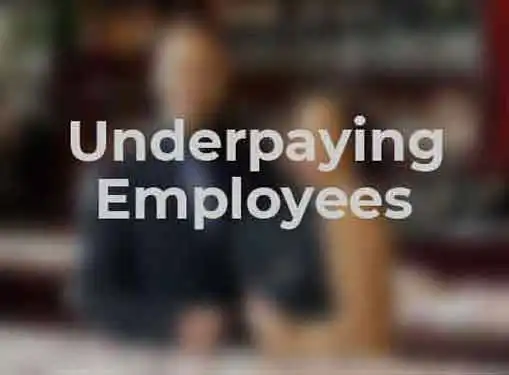Compensating Employees
Underpaying Employees
Written by Nidhi Ann Raj for Gaebler Ventures
Underpaying is as bad and sometimes, even worse than overpaying. It breeds frustration and affects productivity and in the long run, you may lose your employees as well.
One of the biggest problems, entrepreneurs face is to find people who are as skilled as dedicated to their work.

In other words, it is difficult to recruit and retain the right people. To add to this woe, people are generally reluctant to join start ups fearing that they would be underpaid. As an employer who has just started hiring, you may have valid reasons for not paying as much as a bigger firm; but employees need not be empathetic to these reasons. Studies have shown that any company, small or big, that underpays their employees them to lose them altogether, no matter how well they are appreciated in other forms.
A good business owner should never underpay, as you are rightfully taking what belongs to your employees. This makes the employee feel undervalued and they begin to show lesser commitment. This affects productivity and in the long term affects the business.
So how do you gauge if your employees are underpaid (or even overpaid)? To begin with, conduct a market research well in advance even before advertising the job profile. Find out what other companies within the industry (your competitors) are offering for the same role. Decide if you are fiscally capable of paying on the same lines. If your finances are strong enough, you may think about paying higher, if you get a well qualified candidate.
Decide on a salary range you are willing to pay for the position. Once the applications flow in, go through each candidate's resume to better understand how they are currently paid and what are the general salary expectations for the role, based on their current designation, education and work experience. Finally, post interviews you can make a decision on how much you are willing to negotiate with your initial target. However, remember that you must not pay the employee less than the statutory minimum amount they are entitled to receive under the law, as this can lead to possible legal actions later on.
The question that still remains is what if you are not financially able to pay a fat pay check at the moment? Then you need to assess if your business really requires a new position or if you can get one of your existing employees to do the job. If the role is a must have to run your business, and you cannot pay by the industry standards, invent other benefits or compensations that a potential employee may be interested in-like an attractive family health insurance package or accommodation allowances- that may work to be cheaper for you than paying a bigger salary per se.
It is not just enough to pay employees a decent package at the time of joining. In order to retain them, it is also necessary that their salary is revised regularly- that is, you have a strong appraisal system in place. Hikes, bonuses and other occasional benefits are definitely ways to keep the employees happy and motivated. Although paying your employees well, is not the sole factor to keep them dedicated to the company this s one of the major reasons why people move out in search of 'better opportunities.'
Nidhi Ann Raj is a gifted writer who is currently pursuing post-graduate studies at George Brown College in Toronto Canada, where she is specializing in Marketing and Finance.
Share this article
Additional Resources for Entrepreneurs


Conversation Board
We greatly appreciate any advice you can provide on this topic. Please contribute your insights on this topic so others can benefit.